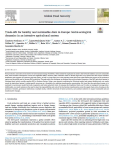Jiménez-Aceituno A., López-Rodríguez M.D., Castro A.J., Cortés-Calderón S., Collste D., Aparicio G., Rölfer L., Bote M.A., Marín L., Gómez-Tenorio M.A., González-Martín B. (2025). Trade-offs for healthy and sustainable diets in Europe: social-ecological dynamics in an intensive agricultural system. Global Food Security, 01/03/2025, vol. 44, p. 100829.
https://doi.org/10.1016/j.gfs.2025.100829
https://doi.org/10.1016/j.gfs.2025.100829
| Titre : | Trade-offs for healthy and sustainable diets in Europe: social-ecological dynamics in an intensive agricultural system (2025) |
| Auteurs : | A. Jiménez-Aceituno ; M.D. López-Rodríguez ; A.J. Castro ; S. Cortés-Calderón ; D. Collste ; G. Aparicio ; L. Rölfer ; M.A. Bote ; L. Marín ; M.A. Gómez-Tenorio ; B. González-Martín |
| Type de document : | Article |
| Dans : | Global Food Security (vol. 44, March 2025) |
| Article en page(s) : | p. 100829 |
| Langues : | Anglais |
| Langues du résumé : | Anglais |
| Catégories : |
Catégories principales 08 - ALIMENTATION ; 8.3 - Politique et Sécurité AlimentaireThésaurus IAMM SYSTEME AGROALIMENTAIRE ; DURABILITE ; SECURITE ALIMENTAIRE ; INNOCUITE DES PRODUITS ALIMENTAIRES ; EUROPE |
| Résumé : | Food production and trade are key drivers of environmental change worldwide. Global initiatives emphasize the need to shift towards healthier and more sustainable diets, with increased consumption of fruits and vegetables (F&V). However, F&V cultivation relies on diverse high-value crop species that often require intensive fertilization and irrigation for optimum yield and quality, as well as a large labor force. This generates trade-offs across scales between the impacts in the production regions and the global need to increase F&V production. Through multi-actor dialogues, we analysed the social-ecological dynamics of the F&V agriculture system in Southeast Spain, which crucially supplies F&V to Northern Europe. Using a new approach combining the 3Horizons method and system thinking tools, our results reveal the agricultural system's context-specific structures as a foundation for exploring transformative opportunities. We found that the agricultural system a) is sustained in a governance model that lacks cooperation and fosters polarized views, 2) surpasses the biophysical limits, and 3) relies on immigrant low-wage labor. Additionally, our results underscore the need to share the responsibilities and costs of the food-system transformation across the supply chain actors, focusing on the potential of retailers, governance institutions at multiple scales, collective structures of farmer producers, and auxiliary industries to support sustainable and just transformative changes. |
| Cote : | En ligne |
| URL / DOI : | https://doi.org/10.1016/j.gfs.2025.100829 |







